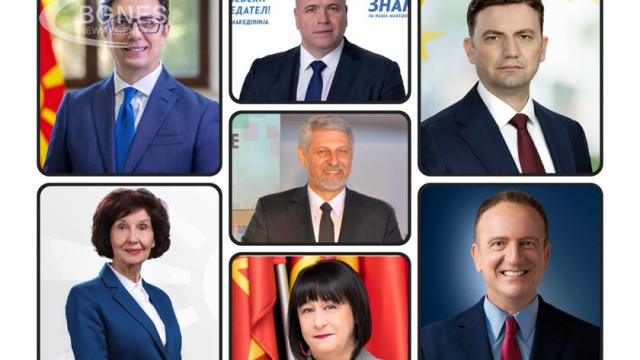Today, April 24, Macedonian citizens will vote in the country's presidential elections, reported BGNES.
1,814,317 people have the right to vote, the Central Election Commission announced. There are 3480 sections open in the country.
Polling stations in the Republic of Macedonia open at 07:00 local time (08:00 Bulgarian), and voting will continue until 19:00 (20:00 Bulgarian local time).
Citizens of North Macedonia who live abroad and are registered to vote can exercise their constitutional right in diplomatic missions and consular offices.
On April 23, citizens included in the special electoral list - the diaspora, those deprived of liberty, those placed in homes for the elderly, the sick and infirm, as well as internally displaced persons - had the right to vote. The members of the electoral commissions who travelled abroad to vote were the first to vote. 191 people are recorded in the special excerpt from the voter list.
A total of 942 observers, foreign journalists and translators are accredited to observe the presidential elections. 342 local and 568 foreign observers and translators are accredited, with the most numerous being those from the OSCE/ODIHR.
The upcoming parliamentary elections in the country on May 8 will be monitored by over 2,000 local and foreign observers.
Victory requires more than 50% support from the country's 1.8 million registered voters, meaning a runoff on May 8 along with parliamentary elections is almost certain. Voter turnout in the second round must be a minimum of 40% for the result to be valid.
Who are the seven candidates?
Favorites for the post are the previous president Stevo Pendarovski from the Social Democratic Union of Macedonia /SDSM/ and Gordana Siljanovska-Davkova from VMRO-DPMNE.
A poll of public opinion conducted by the Center for Political Research and Communications /CPIK/ in RSM gives Siljanovska a lead with 20.4% support against 16.8% for Pendarovski. The two already faced each other in 2019, when Pendarovski won the election in the second round.
Anti-Bulgarian rhetoric and attacks on the Negotiation Framework with the European Union /EU/ dominated the election campaign.
At events and meetings with citizens, the head of state pointed out that the Republic of Macedonia faced two blockades on the way to the EU - "the external one from Bulgaria and the internal one from VMRO-DPMNE". The President advocated for North Macedonia to remain in the Serbian project initiative "Open Balkans".
Over the years, Gordana Siljanovska-Davkova has been an opponent of the Prespa Agreement between Macedonia and Greece, which resolved the dispute over the name of the Republic of Macedonia, and Athens supported Skopje for NATO and the EU. Siljanovska is firmly against the Treaty of Friendship with Bulgaria since 2017. During this year's election campaign, she firmly followed the anti-Bulgarian political line.
Tight race in Albanian political bloc
The previous foreign minister of North Macedonia, Buyar Osmani, will face Arben Taravari, chairman of the Alliance of Albanians /AA/ and mayor of Gostivar.
Taravari, nominated by the coalition of Albanian opposition parties, secured 7.9% support, while Buyar Osmani, nominated by the European Front led by the Democratic Union for Integration (DSI), received 6.6%, according to a CPIK survey.
Osmani defends the position that Skopje must fulfil its obligations under the Negotiating Framework with the European Union. He has called for the country to withdraw from Serbia's Open Balkans project and has often noted the strong Russian influence in Skopje.
Taravari also supports the inclusion of Bulgarians in the Preamble of the Macedonian Constitution. However, he faces splits in his party. At the moment, it has two wings - one of Taravari, who decided to join the united Albanian opposition and the second - of the chairman of the National Assembly of the formation - Ziyadin Sela, who opposed this decision.
Three candidates with a hard-line pro-Russian position will fight for the support of Macedonian citizens. Bilyana Vankovska is the candidate of the Left. Within this year's election campaign, she shares the same anti-Bulgarian position with VMRO-DPMNE candidate Gordana Silyanovska-Davkova. Vankovska advocated the cancellation of the so-called "French proposal" to continue negotiations with the EU and criticized Skopje's conditions for European integration. She insists that the country join the BRICS.
The mayor of Karposh municipality, Stevcho Yakimovski, is a presidential candidate from the GROM party. He is a former representative of the SDSM. Yakimovski is known for his opposition to the Good Neighbor Treaty with Bulgaria, his rejection of constitutional changes and his warm ties with Belgrade and Moscow. It is part of the sanctions "black list" of the USA since March 18 of this year.
Maxim Dimitrievski is the candidate of the party Za Nasha Macedonia /ZNAM/ and a former representative of SDSM. He is a politician and public figure, mayor of Kumanovo - his hometown. According to him, "changes in the Macedonian constitution are not necessary to prevent the disintegration of the unity of the state". According to him, a change in the Negotiating Framework is not an unattainable goal. /BGNES







